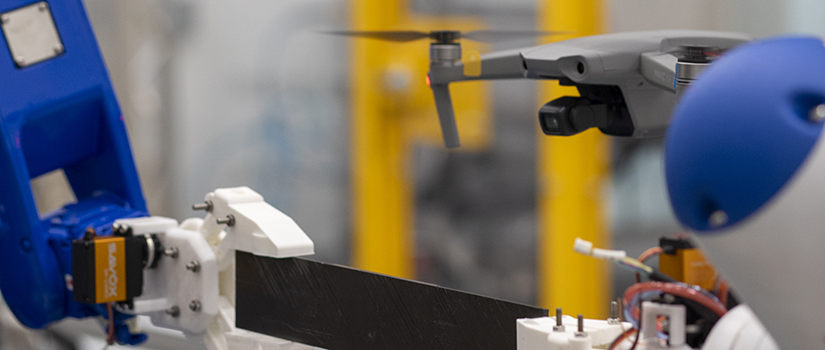$3.8 million NSF EPSCoR grant to enable expansion of Future Factories Lab at McNair Aerospace Center
When University of South Carolina Associate Professor Ramy Harik began to imagine factories of the future, he couldn’t have pictured the COVID-19 pandemic. But he knew without investing in smart manufacturing, the industry was susceptible to disruption. Now, it’s clear that supply chain issues and manufacturing hiccups can severely affect our daily lives—not just as consumers–but as health care providers, medical patients and business owners.
Now, with a $3.8 million EPSCoR RII Track-2 grant from the National Science Foundation, Harik is committed to strengthening the manufacturing infrastructure in South Carolina and the U.S., from operational technologies and process optimization to developing the essential upskilled workforce to support these future factories.
I think we can go from being a follower to a leader in manufacturing and setting the stage of how future factories should look for the rest of the United States.
- Ramy Harik, associate professor
“Manufacturing is no longer a luxury that we can offshore. It’s essential, and it’s a cornerstone for our economy,” Harik says. “Future factories will be grounded in technology that’s continuously evolving, so we need to connect industry with academia in a way that creates a very healthy transfer cycle for workforce development.”
Harik was named PI on the project, “Enabling Factory to Factory (F2F) Networking for Future Manufacturing,” submitted in conjunction with the Statler College of Engineering and Mineral Resources at West Virginia University. The four-year project will also involve industry sponsors in artificial intelligence, digital transformation and automation.
“Smart manufacturing enables us to not only keep the manufacturing industry competitive in a high-wage country, but also to improve quality, efficiency and sustainability,” says Thorsten Wuest, associate professor at WVU and Co-PI on the project. “We have only begun to scratch the surface of what this fourth industrial revolution has to offer, and we need to work together - manufacturing companies, academia and policy makers - to support this transition.”
The question at the center of the collaboration is: what will future manufacturing facilities look like and how will they work? The research team will investigate how interactions in and between facilities will happen, how real automation behaves with humans and non-humans, and how these parties can act in accord to support the entire manufacturing process.
Harik says that manufacturing is a strong part of the infrastructure in South Carolina, but there’s an opportunity to close the gap in workforce development and factory capabilities. He believes the EPSCoR funding will help both South Carolina and West Virginia serve as pioneers in smart manufacturing.
“We have the brains. We have the talent. We have the capacity and the desire to know how manufacturing will look in 10 years,” he says. “I think we can go from being a follower to a leader in manufacturing and setting the stage of how future factories should look for the rest of the United States.”
The funding will allow Harik to significantly expand the Future Factories Lab at the UofSC McNair Aerospace Center. He plans to create a small-scale manufacturing facility, complete with robotics, vision systems, conveyor belts and data sensors that can then be tested under different disruptive scenarios. His research group will be able to see how an automated facility “thinks” and what kind of cyber infrastructure will be needed to support it.
“It is cutting-edge research. It has the real industrial solutions. And we can talk about the innovation; we can talk about all of these things,” Harik says. “But ultimately, we are creating an ecosystem that provides the U.S. with stability and resilience: a manufacturing resilience ecosystem.”
About this Funding
NSF EPSCoR RII Track 2 FEC grant, "Enabling Factory to Factory (F2F) Networking for Future Manufacturing," was awarded to Ramy Harik (PI) the University of South Carolina and Thornsten Wuest (Co-PI) at West Virginia University for a total of $3,832,326 over four years. Co-PIs on this project include Amit Sheth (Artificial Intelligence Institute, UofSC); Paul Ziehl (Mechanical Engineering, UofSC); Hengtao Tang (College of Education, UofSC); Zhichao Liu (Industrial and Management Systems Engineering, WVU); and Todd Hamrick (WVU).
